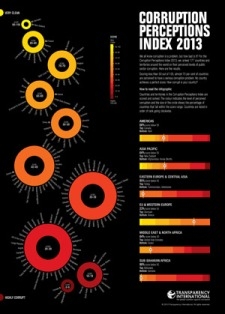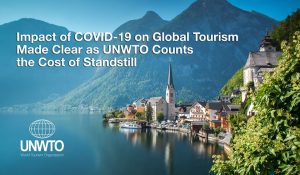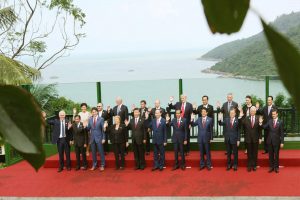Nepal 116th in list of corrupt nations : Transparency

Kathmandu : Nepal ranked 116 th in a list of most corrupt countries in the world, while India is ranked 94th , Pakistan ranked at 127 and Bangladesh at 136 according to a new report of Transparency International .
India has done better than its neighbour Pakistan (ranked 127th), as also countries like Thailand (102nd), Mexico (106th), Egypt (114th), Nepal (116th), Vietnam (116th), Bangladesh (136th) and Iran (144th).
While India maintained status quo with its rank at 94 and the same score as last year, Pakistan and Bangladesh improved their rankings. Pakistan moved up from a rank of 139 in 2012 to 127 this year and Bangladesh bettered its rank from 144 to 136.
More than two-thirds of the 177 countries ranked in Transparency International’s Corruption Perception Index 2013, scored below 50, on a scale from 0 (highly corrupt) to 100 (clean).
Denmark and New Zealand were tied for the first place with a score of 91, followed by Finland and Sweden (89) and Singapore (86).
None of the countries have managed to get the perfect 100 score. Top-ranked Denmark and New Zealand have scored 91 points each to share the first place on the list.
Somalia shares lowest rank with North Korea and Afghanistan with 8 points each. Those scoring marginally better than these three countries include Sudan, Libya, Iraq, Uzbekistan, Syria, Haiti, Venezuela, Zimbabwe and Myanmar.
Denmark and New Zealand are followed by Finland, Sweden, Norway, Singapore, Switzerland, Netherlands, Australia and Canada in the top ten. Among other major countries, Germany is at 12th, the UK 14th, Hong Kong 15th, Japan 18th and the US at 19th spot.
Releasing the list in Berlin on Dec. 3 , Transparency International said that its “Corruption Perceptions Index 2013 offers a warning that the abuse of power, secret dealings and bribery continue to ravage societies around the world”.
“Corruption within the public sector remains one of the world’s biggest challenges, Transparency International said, particularly in areas such as political parties, police, and justice systems.
“Public institutions need to be more open about their work and officials must be more transparent in their decision-making. Corruption remains notoriously difficult to investigate and prosecute,” it added.














